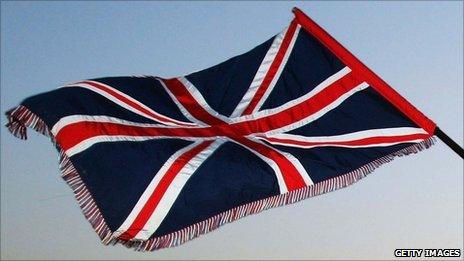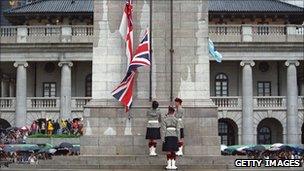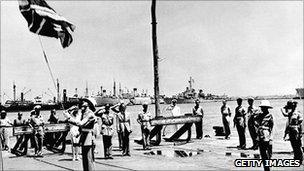How Britain said farewell to its Empire
- Published

A POINT OF VIEW
The end of the British Empire saw the Union flag lowered in ceremonies around the world - but the so-called "wind of change" continues to blow, observes David Cannadine in his Point of View column.
The recent controversy surrounding the discovery that the British taxpayer is footing the bill for a family of former asylum seekers from Somalia who are living in a luxury town house in London reminds me that it's exactly 50 years since the colony of British Somaliland became independent. As such, it was by no means the earliest imperial territory to gain its freedom: India, Pakistan, Burma, Ceylon and Malaya had already preceded it in Asia; and so, too, had the Sudan and the Gold Coast in Africa.
But it was the independence of British Somaliland in 1960, along with the famous "wind of change" speech which Harold Macmillan delivered in South Africa earlier in the same year, which ushered in the decade when the dismantling of the British Empire reached its climax, as no fewer than 27 former colonies in Asia, Africa and the Caribbean began their new lives as new nations. Of course, it took until 1997, when Hong Kong was handed back to China, for the process of imperial liquidation to be completed, and there would be some difficult and protracted episodes along the way, especially in the case of Southern Rhodesia, which did not become independent as Zimbabwe until 1980.
But it was during the 1960s that it first became unequivocally clear that the whole of what was left of the British Empire was heading rapidly to decolonization and irreversibly to dissolution. So it's scarcely surprising that some of my most vivid memories from that decade were of the independence ceremonials reported on the nightly news bulletins, at least once, and sometimes twice, or even three or four times a year. At the stroke of the midnight hour, in a specially constructed stadium in the capital city, and in the presence of a member of the British Royal Family representing the Queen, the Union Jack was pulled down for the last time, imperial rule came to an end, and the new country's flag was unfurled to tumultuous applause.
Thus was power transferred in an orderly and dignified and ceremonial manner, from the old empire on the way out to the new nation on the way in, and from a pro-consular elite to a popularly elected government. Royal Highnesses and prime ministers delivered speeches expressing mutual admiration, esteem, affection and goodwill, there were parties and fireworks galore, and ever after, the occasion would be annually commemorated in the former colony as Independence Day.
During the 1960s, these colonial departures and across-the-sea goodbyes became so frequent that a retired British army officer, Col Eric Hefford, embarked on a new but essentially time-limited career as a sort of late-imperial, trans-oceanic, globe-trotting Earl Marshal, organizing the events that proclaimed what came to be known as 'freedom at midnight'.
In one guise, he was the undertaker of the British Empire, orchestrating valedictory colonial observances; in another, he was the impresario of emancipation, planning the independence celebrations by which new nations came to birth. The costs varied, according to the size of the colony and the scale of the spectacle: from less than £200,000 in Malta to more than £2m in Nigeria.
But since the British Empire had (among many other things) existed and endured as an ornamental pageant, it was at least consistent with that element of imperial theatricality that it also ended and expired in a unique succession of farewell rituals, the like of which were not to be found anywhere else in the world, even though other European empires were going into liquidation at exactly the same time.

The 1997 Hong Kong handover effectively brought the British Empire to an end
Yet when Col Hefford claimed that these late-imperial extravaganzas, combining colonial endings and national beginnings, were "plucked from the book of ancient British traditions", he couldn't have been more wrong. There had been no such ceremonials when the British departed in defeat and disarray in 1782 after the successful rebellion of the thirteen American colonies; when the Irish Free State became independent in 1921, the last British Lord Lieutenant, Viscount Fitzalan, departed from Dublin Castle as un-ostentatiously as he could in a private car; and as the great dominions of Canada, Australia, New Zealand and South Africa gained ever more autonomy from the mother country, they did so gradually and incrementally, rather than suddenly and ceremonially on a particular day.
Far from being the embodiment of ancient British traditions, the rituals associated with the end of the British Empire dated back only to 1947; and insofar as any one individual can be described as the inventor of what briefly became these traditions of termination, it was the last Viceroy of India, who also happened to be a royal personage, namely Lord Mountbatten.
As the central figure in the independence pageants that took place on successive days in August 1947 in both India and Pakistan, Mountbatten was determined that the transfer of power should be well planned and carefully stage managed: he wanted the new nations to begin in peace and with feelings of goodwill towards the former imperial power; he wanted the British to leave with dignity and with as much residual influence as they could retain; and he wanted the ceremonials to be a personal triumph.
And so in some ways, they were, with the crowds, the processions, the speeches, and at the stroke of the midnight hour the lowering of the Union Jack and the raising of the two new national flags. Although no one could have known it at the time, this would be the beginning of a sequence of valedictory spectacles which would take place during the next half century, and they would all be indebted to the template that Mountbatten had created in South Asia.
With the exception of the Queen herself and the Queen Mother, most members of the Royal Family were called upon to take part in such proceedings, and after the Hong Kong handover in 1997 which effectively brought the British Empire to an end, it was entirely appropriate that Prince Charles steamed away on what would also be the final voyage of the Royal Yacht Britannia.
Yet, as so often with such public displays, the impressions given of an orderly transfer of power, and of the continuing warm and friendly relations between the British and their former colonists, were often only part of the story. In India and Pakistan, the euphoria of independence was soon followed by the reality of partition, and by the terrible bloodshed which ensued; while the rulers of the former princely states felt betrayed by the Viceroy, when he gave them no choice but to throw in their lot with the two new successor nations.
And thereafter, as other British colonies followed suit, the consensus and goodwill that characterised their midnight celebrations were often little more than superficial, temporarily papering over significant disagreements and deep-rooted tensions, and only briefly erasing what were often unhappy memories and bitter resentment. This was true in Malaya when freedom came in the aftermath of the Japanese invasion and the later Communist insurgency; it was true in Kenya after the decade long Mau Mau emergency; and it was true in Southern Rhodesia after the unilateral declaration of independence by Ian Smith and the civil war that followed.

The British left Israel in 1948, but the legacy of colonial rule continues to be felt
Indeed, on several occasions, the political situation in British colonies on the brink of independence was deemed to be so precarious and uncertain that no member of the House of Windsor was sent out to represent the Queen at the handover. This was the case in Burma, the Sudan, Cyprus and Aden; and it was also the case in British Somaliland in the summer of 1960.
Like most former British colonies, it had resolved to become a republic on gaining its independence, but unlike many of them, it had decided not to join the Commonwealth. Even more unusually, it did not become a separate, autonomous new country, but merged with its larger neighbour, which had previously been Italian Somaliland, thereby forming the new composite nation known as Somalia.
Yet this did not prove to be a happy or a lasting arrangement. After a long period of political instability, escalating violence and border clashes, the central government of Somalia collapsed in 1991, and in the same year, the former British Somaliland proclaimed itself to be a breakaway republic, though it has yet to receive significant international recognition.
Today, the whole region remains deeply troubled, with bitter endemic conflict on land, and with pirates roaming the seas nearby. So it's not altogether surprising that some Somalis have sought asylum in Britain, whatever the consequences and controversies for them here may be.